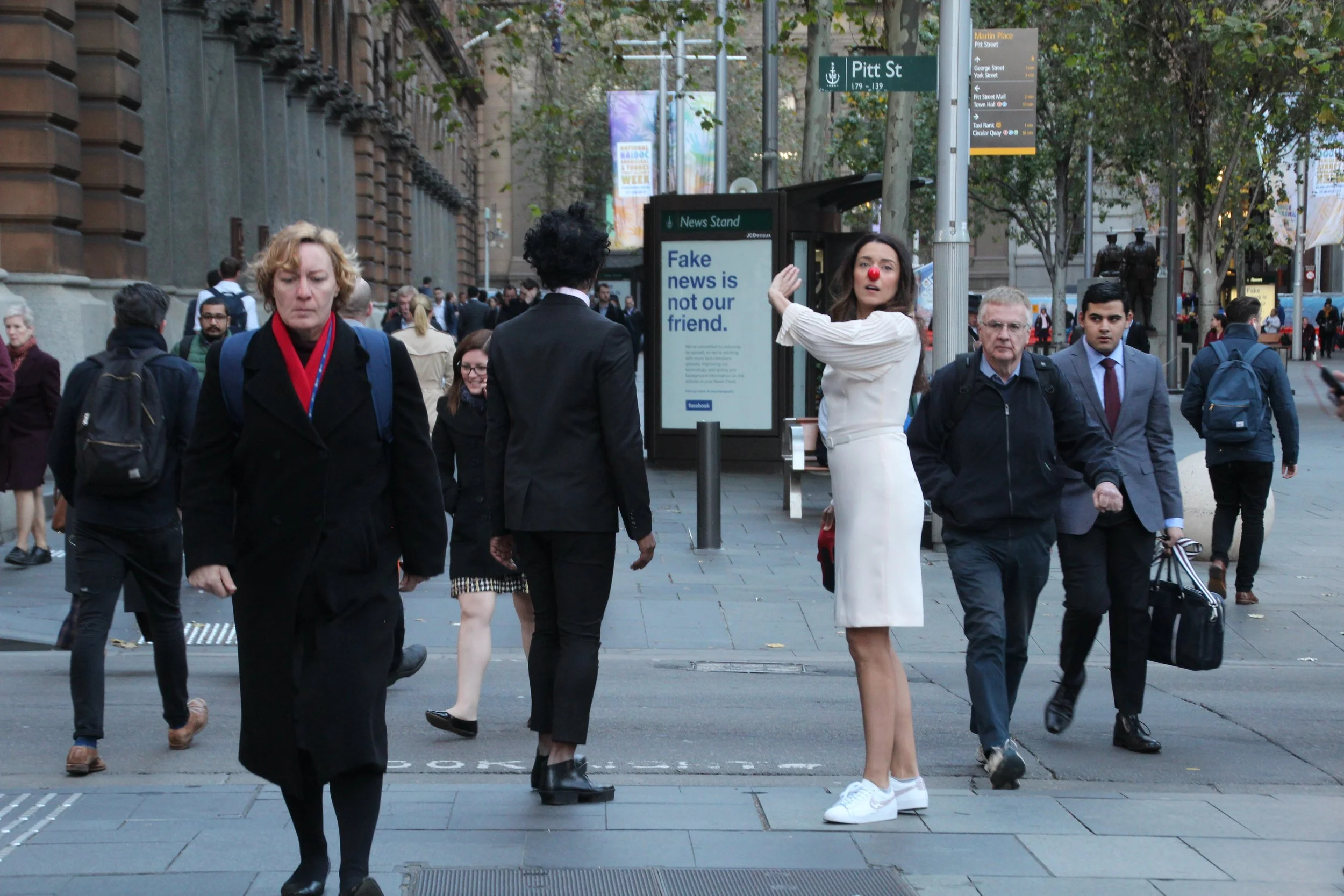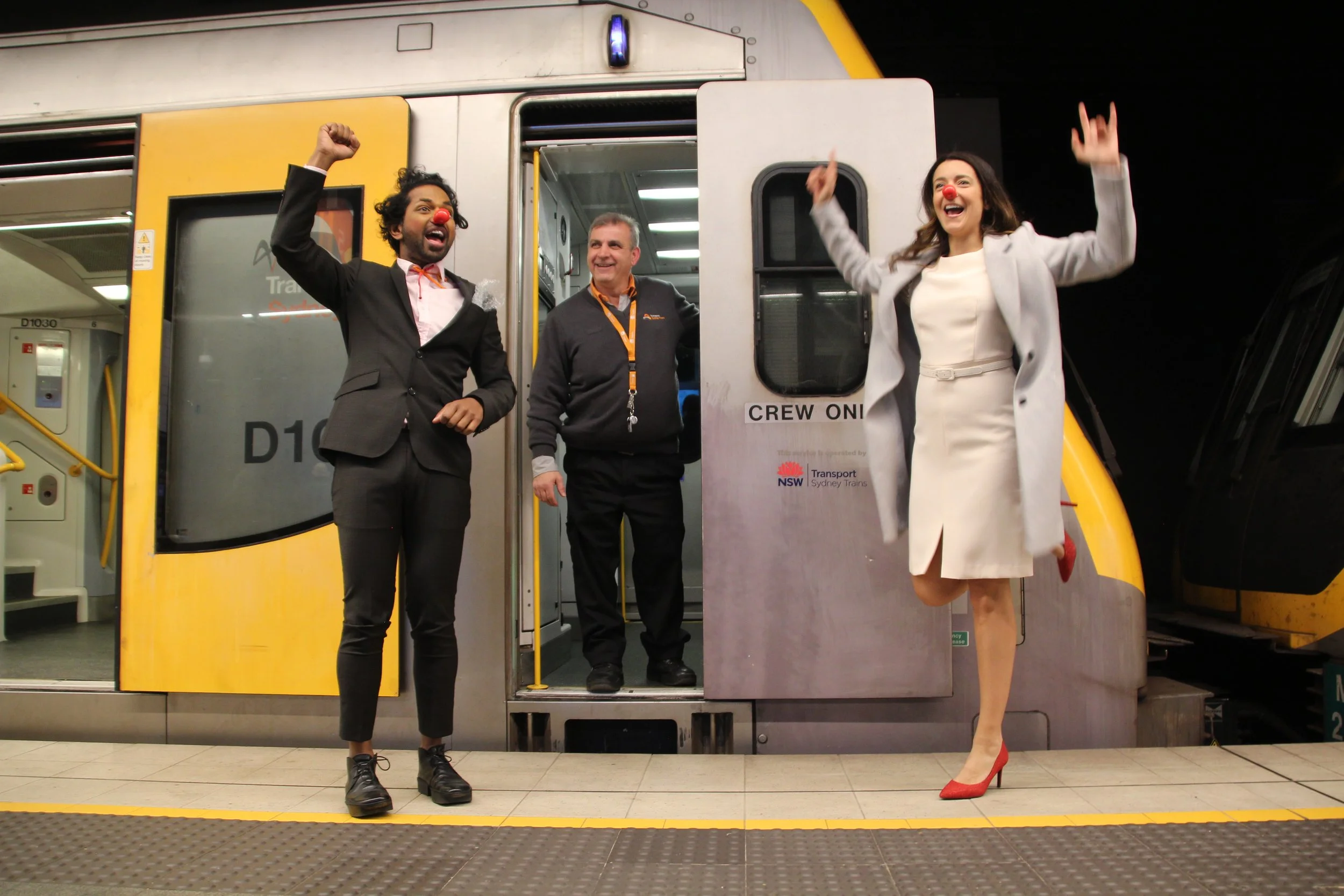The absurdity of occupations
I’ve always wanted to be a tissue box attendant on trains.
Imagine it: riding the morning commute, handing tissues to every sniffler before their mucus symphony destroys the peace. It’s not a “real” job, yet I’ve dreamt of it.
We spend most of our lives at work. We become our jobs: we dress for them, we answer to them, sometimes we even introduce ourselves as them. (“Hi, I’m Alicia, a…”). Maybe the question isn’t whether we need jobs, but what kind of work makes us feel alive.
This question sat underneath our most recent Clown Monthly Playground, where we explored occupations. Not as LinkedIn titles, but as sincere, ridiculous, heartfelt performances of work.
My clown is deeply unqualified to…
We began on paper. The journal prompt was simple: “My clown is deeply unqualified to…”
The responses were anything but simple. Someone wrote they were unqualified just “to be here.” Another dreamt up being a grief attendant for falling leaves - a professional mourner for autumn. One confessed their clown was unqualified to be a lion.
That last one became a scene: the clown, in a tie, interviewed for the role of Lion. The image was poetic and absurd all at once - a small body in corporate drag trying to embody ferocity. It said more about our culture of corporate expectations than any lecture could.
The point wasn’t to be clever. It was to expose the delicious tension of the clown: wild enthusiasm with no credentials. The willingness to take the job anyway, and to fail publicly, beautifully, repeatedly.
Warming the body for work
From the page we moved into the body. Hips circling, torsos swaying, limbs swinging, pausing. Clowns get paid to pause. That’s what my coach told me, and I believe him. Too much movement spoils the broth.
The warm-up reminded us: a job is not just a contract. It lives in the body. The bent spine of the apprentice, the broad chest of the CEO. Our occupations leave traces in our posture, in our nervous systems, in how we carry weight.
Chefs, librarians, lifeguards
Then we played. The old improv game “Giants, Wizards, Elves” became Chefs, Librarians, Lifeguards.
Chefs: round, noisy, stirring, shouting “Oui chef!”
Librarians: triangular, small, precise, whispering “shhh.”
Lifeguards: squarish, tall, scanning, blowing whistles.
Chefs beat Librarians, Librarians beat Lifeguards, Lifeguards beat Chefs.
We embodied them full throttle, then chased each other across the room. And what emerged was not just silliness but a sudden rush of competitiveness. Adults, who five minutes earlier were journaling about their clowns’ unqualified CVs, were now desperate to win, running full pelt, shrieking, plotting strategy.
The game revealed how quickly we slip into roles: not just the physical archetypes of chef, librarian, lifeguard, but also the old patterns of competition, hierarchy, and belonging. The laughter came from that recognition: how easily we embody what’s given to us, how fiercely we defend it, and how quickly we invent new categories when the old ones feel too small.
Micro-mimes, clock-in lines & job interview with the audience
From there, we zoomed into smaller tasks and rituals of work. In pairs, participants mimed simple occupational actions; shelving books, baking bread, stamping tickets, and their partners copied them detail for detail. Then we replayed those same mimes “in clown state”: breath catching, over-fascination, heartbreak.
One by one, clowns “clocked in” to the workplace with a single costume element. They crossed the space, met the audience with their eyes, and revealed a tiny task: a stamp, a wipe, a beep. The game was in the detail: repeating the task smaller, slower, and holding the moment just long enough for the laughter to arrive.
At the same time, another group entered the job interview with the audience A clown stood before a panel of interviewers (the audience), asked to show their answers through body first, words last:
Show us the very first thing you do when you start your shift.
What emerged were not résumés, but rituals. One became a water sommelier with a bottle, cork, and opener, struggling as the cork slipped inside the bottle, transforming the task into an earnest catastrophe. Another became a cloud watcher, chasing the ceiling. Another, a world measurer, fumbling with a failing tape measure.
Words were rare, but bodies spoke volumes. We discovered: our jobs are absurd rituals. And the clown, stripped of credentials, sincerity intact, reveals the poetry hiding inside them.
Fired at the office & the wrong person in the wrong place
The afternoon spiralled into improvisations: a clown boss firing an employee; the wrong person in the wrong place (the chef replacing the plumber, the painter replacing the sex worker).
One “firing” scene turned into a tearful mutual hug that neither clown could escape from. Another “wrong person” walked into the room to perform a doctor’s visit, but could only make pastry with trembling sincerity.
Failure piled upon failure. And yet the clowns carried on with sincerity, protecting the task, never the gag. The audience saw themselves, their own workplaces, their own absurd systems, mirrored back at them.
What about AI, redundancy, the future?
Outside the rehearsal room, the world trembles: jobs automated, industries collapsing, people afraid of being left behind. AI is “coming for our jobs.”
But perhaps the clown suggests something else: maybe work was never the point. Maybe the real question is: what do we need humans for?
We don’t need more spreadsheet monkeys. We need cloud watchers, tissue box attendants, world measurers, professional listeners, apology distributors, giggle dealers.
The clown invents these jobs not because they make economic sense, but because they reveal human longing. They restore the playful, the poetic, the unnecessary-necessary.
The future belongs to fools
We spend a significant portion of our lives at work. Jobs change, industries shift, titles disappear. Sometimes that loss can be painful, especially when our identity is tied to what we do.
But clowning reminds us gently: we are not our jobs. We are bodies, eyes, rhythms, fools. We are still here, even when the role falls away.
That’s why I still dream of being a tissue box attendant on trains. Or a cloud watcher. Or a world measurer with a broken tape measure. Jobs that don’t exist (yet) but reveal something human, our longing for care, play, connection.
The Playground this month showed us that work is ridiculous, identity is slippery, and laughter can be a kind of resilience. It doesn’t take away the reality of work’s challenges, but it gives us a way to breathe, to play, to imagine.
Because maybe the future doesn’t belong to the most efficient workers after all. Maybe it belongs to those willing to be foolish, curious, and beautifully human.



